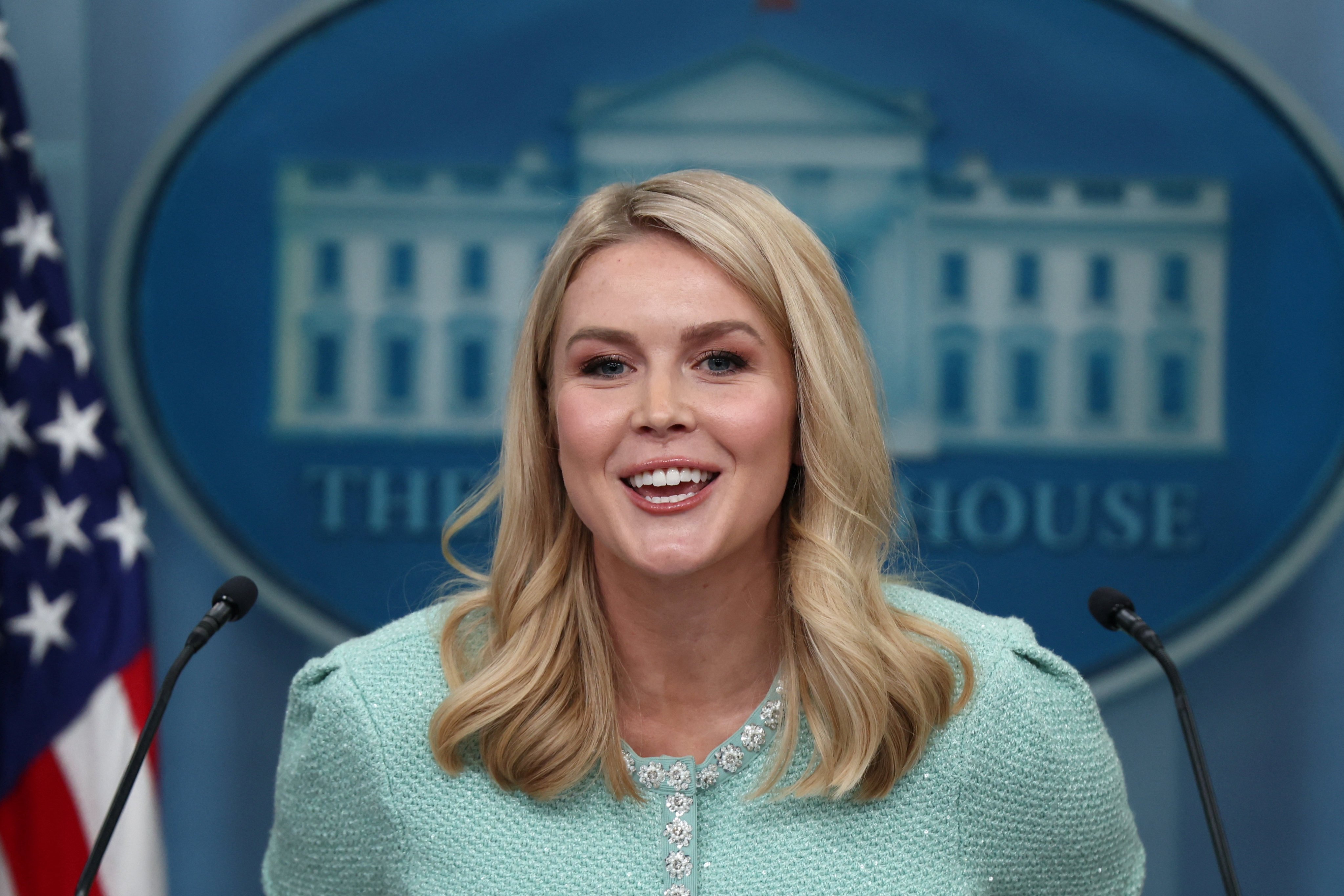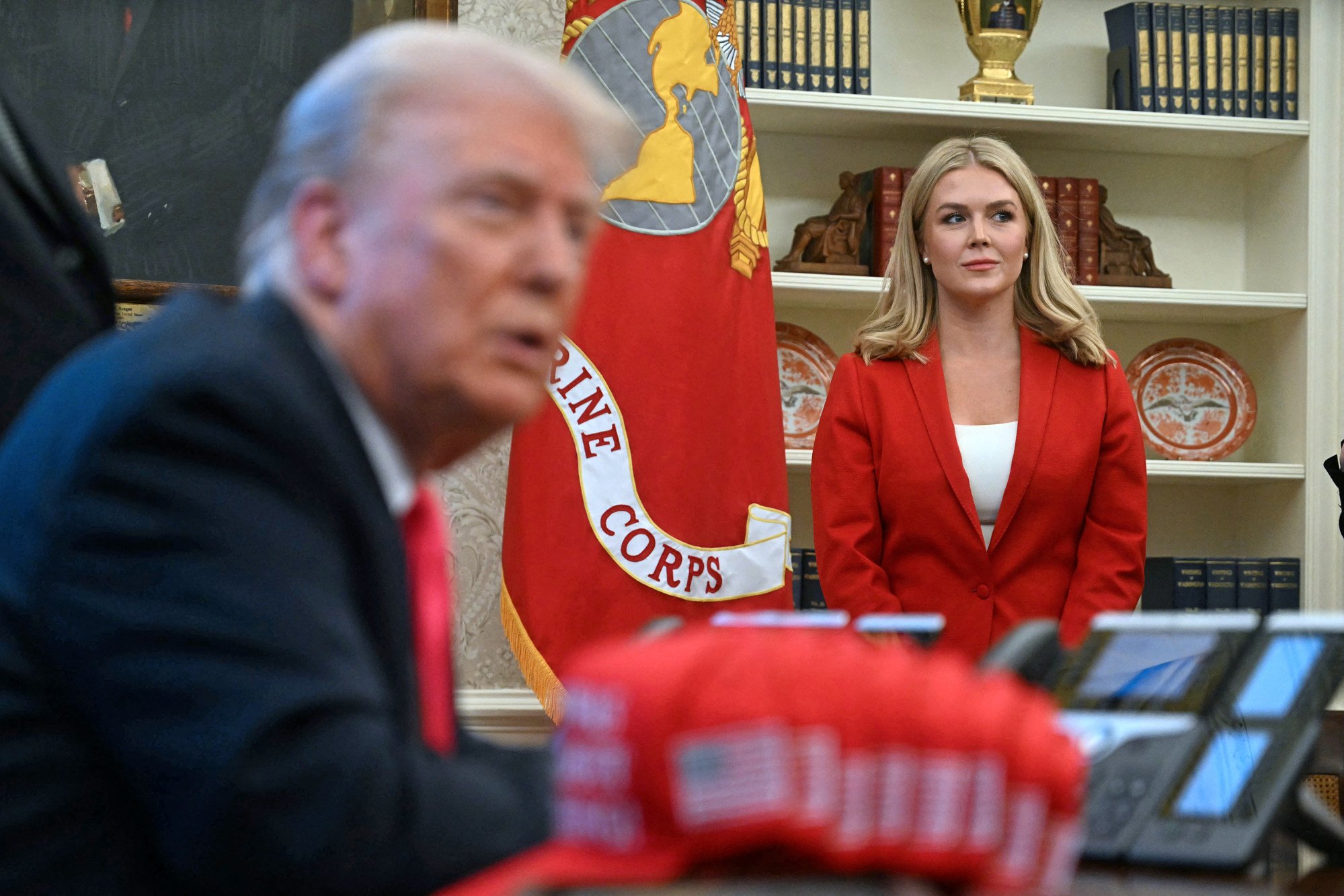Why Trump Spokeswoman Karoline Leavitt Has Become An Unlikely Online Star In China

As Beijing and Washington lock horns in a bitter trade war, a close aide to US President Donald Trump has gained surprising popularity among internet users in China.
Karoline Leavitt, the youngest White House press secretary in history, has emerged as an online celebrity in China over the past month after video clips of the 27-year-old confronting US journalists spread on social media.
Some said they found her ability to combine motherhood and career appealing, while others said her calm yet assertive tone when defending Trump’s controversial policies set an example for how to be both young and strong in the workplace.
“She’s really blonde, beautiful and eloquent,” wrote Zhang Jieyi, a social media user in Shandong province.
“Look at the eloquence and temperament of this beautiful spokesperson, there is no frustration but only calmness, being assertive without being rude and pushy,” Zhang said in a post accompanying a 43-second video.
The clip showed Leavitt taking a question last month about whether Trump would attend this year’s White House Correspondents’ Association dinner after it was announced comedian Amber Ruffin would be the featured entertainer. Ruffin has called the US leader a “toddler with his pants pulled down”.
Steven Tian, a 47-year-old white-collar worker in Shanghai, said Leavitt set an example for Chinese employees, who are often hard-working but quiet when defending themselves in the workplace.
“She’s smart, tough, concise, and refreshing,” Tian wrote on social media last month after watching videos of Leavitt’s first two press briefings at the White House.
“Looking at ourselves in the workplace, how should we negotiate with foreign team leaders who are too pushy, or how could we better express our thoughts when facing some hostile colleagues?” he said.
According to Jingsi Wu, an associate professor of media studies at Hofstra University in New York, Leavitt’s popularity reflects a growing trend in China of celebrating strong and independent women.
Chinese women have traditionally been expected to be supportive of their husbands and focus on raising children, but as more women are educated and earn more than ever, many are looking for roles beyond marriage and family.
This makes Leavitt an aspirational figure for many in China, especially those who struggle to navigate the daily realities of having a full-time job while serving as the primary caretaker at home.
“You see the ‘not-so-hidden’ parts that reflect a more traditional concept of women being family-oriented, attractive, and supportive of their husbands’ equally, if not more, successful careers,” Wu said.
“Leavitt is the latest example of a traditionally attractive woman who married into [wealth], had a child before returning to work just a few days later, and who can hold her own,” Wu said.
Born in a small town of around 7,000 people in the state of New Hampshire, Leavitt was the first in her family to graduate from college.
She was an assistant press secretary and presidential writer during Trump’s first administration, and in 2021 she worked briefly for Republican congresswoman Elise Stefanik of New York, who has been nominated by Trump to serve as the US ambassador to the United Nations.
In 2022, Leavitt ran for US Congress, winning the Republican Party nomination to represent her New Hampshire congressional district but ultimately losing in the general election.
She is married to Nicholas Riccio, a real estate developer 32 years her senior.

Leavitt is not the only US public figure in Trump’s orbit to become an unexpected hit on Chinese social media. Ivanka Trump, the US president’s eldest daughter, has gained a devoted following for her role as a caring wife and mother as well as an attractive career woman with a fashion business.
Leavitt’s speaking style – including her harsh words for reporters from what she has called “mainstream fake news” – is familiar to White House observers. Most of Trump’s press secretaries from his first term, including Sean Spicer and Sarah Huckabee Sanders, spoke in a similar way.
White House press secretaries Jen Psaki and Karine Jean-Pierre, who served under former US president Joe Biden, were also known for their strong words and assertiveness.
Keyu Alexander Glanz, a PhD candidate and research assistant at Georgia State University’s department of communication, said Leavitt’s age, race and appearance had captured the attention of social media users in China who were able to look past politics.
“She is only 27 years old and the youngest White House press secretary; she is also white and blonde,” Glanz said.
“Her assertive and combative rhetoric, her young age, and nice-looking appearance formed a kind of eye-grabbing contrast, which appealed to the Chinese social media.”
“In an era where mainstream media are stigmatised as elite-representing fake news, social media users, from China or other countries and regions, may really see her talking points as convincing and compelling,” said Glanz, who studies China-US diplomatic communication and foreign policy narratives.
Echoing Trump’s animosity towards the traditional media, Leavitt has vowed to hold media outlets accountable for what she called “lies” about the Trump administration.
Rose Luqiu, an associate professor at Baptist University’s School of Communication in Hong Kong, said there was growing rhetoric within China about the Western media’s anti-Chinese bias, and this could also win Leavitt support among Chinese.
“Leavitt’s aggressive demeanour as the White House press secretary is seen by these individuals as ‘venting their frustrations’ by putting journalists in their place.”
Popular Products
-
 Camping Survival Tool Set
Camping Survival Tool Set$106.99$73.78 -
 Put Me Down Funny Toilet Seat Sticker
Put Me Down Funny Toilet Seat Sticker$3.99$1.78 -
 Stainless Steel Tongue Scrapers
Stainless Steel Tongue Scrapers$24.99$16.78 -
 Stylish Blue Light Blocking Glasses
Stylish Blue Light Blocking Glasses$61.99$42.78 -
 Adjustable Ankle Tension Rope
Adjustable Ankle Tension Rope$38.99$26.78